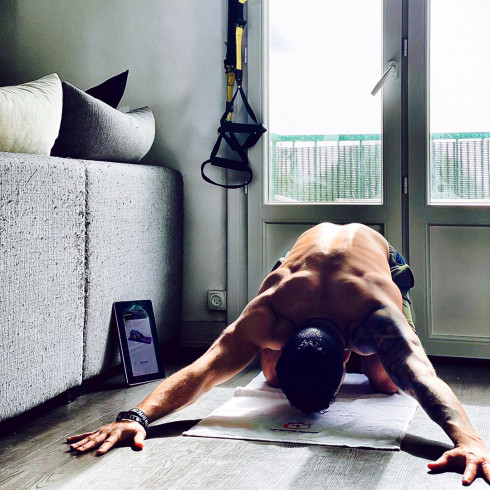When you train intensively, you do not always have the same energy or the same desire to train. It happens that the training of the day could be postponed for tomorrow ... Nevertheless, it is strongly advised to the athlete who wants results not to listen to this little voice that pushes him to agree some respite for a certain reason. On the other hand, the inten-sity of everyday training can sometimes lead to overtraining. At this time, it is advisable to go easy. How can we tell the difference between transient fatigue and overtraining?
First of all, if you feel tired, consider first in your life if there is not a concrete reason for this fatigue. If you have gone out the day before or if you have a moral blow following personal events, this fatigue is only normal. Similarly if you have insomnia or if you go out of a period of intense competitions.
If this fatigue persists despite the rest, then it is sometimes appropriate to slow down or lower the intensity. Slow down first, because you sometimes have to be wary of sensations felt before training. Sometimes you are wondering if you have done well to come to train, you begin your training without conviction, just by acquaintance, so as not to feel guilty for not having carried out training. However, as the session progresses, your sensations become better. It also happens that these sessions start badly and end in apotheosis and allow you to beat your records.
On the other hand, the opposite is true. You can come to the room in a super shape, with the impression that it is the session of your life, but once in the heart of the matter, nothing goes more, no more juice, everything seems more difficult than usual.
How to explain these differences between sensations and reality? The sleep ? The food ? The social life ? The biorhythm? The climate ? Supplements? Difficult to say which element predominates in this kind of situation. Anything can happen and even combine. One thing is sure i that the bad feelings are transient and the good ones too. You can't do "record" training sessions. You just have to accept the ups and downs by doing your best to counter them to the fullest. You've probably already done some training where you feel that between the series, you can not help but yawn. On those days, reduce rest times, make combined sets, superset or giant. This will give your session a different rhythm and will require you to rest less. This more "cardio" training should leave you breathless after each set, wake you up and prevent you from yawning.
Never do a heavy workout if you feel you are not in good shape as soon as you place yourself under the bars. Revise your assumptions down and change the training for a slower training more concentrated on your muscle. You will undoubtedly make a profitable and positive session despite your form, whereas if you continue to aim at the performance, you risk injuring yourself and in any case you will not be satisfied with your training session.
If your fatigue persists for more than a week while you have paid attention to rest and decrease your intensity a little, then you may be victim of an overtraining. Check if your intake of vitamins and minerals is sufficient, rest, do the "union minimum" training until full recovery. If you do not listen to your body, then the wounds can begin to manifest: First, tendonitis or periostitis, but more severely, breakdown, muscle tear or tendon.
It can therefore be said that the fatigue is not abnormal but that it is necessary to become aware of it and to know well the reason for this stroke so as not to overestimate or underestimate it.
 Looking thinner but at a heavier weight? Is that possible?04/10/2021Posted in: Our tipsAdvertising has shaped our thinking! We have been forced for years to believe that losing weight is the key to having...Read more
Looking thinner but at a heavier weight? Is that possible?04/10/2021Posted in: Our tipsAdvertising has shaped our thinking! We have been forced for years to believe that losing weight is the key to having...Read more 10 Expert Tips to Maximize the Effectiveness of Creatine26/08/2024Posted in: Our tipsThis article presents ten tips to maximize the effectiveness of creatine. It emphasizes the importance of choosing...Read more
10 Expert Tips to Maximize the Effectiveness of Creatine26/08/2024Posted in: Our tipsThis article presents ten tips to maximize the effectiveness of creatine. It emphasizes the importance of choosing...Read more 10 BENEFITS OF GLUTAMINE.02/01/2024Posted in: Our tipsDiscover the power of L-glutamine, an underrated superhero in the world of amino acids! Essential for revitalizing...Read more
10 BENEFITS OF GLUTAMINE.02/01/2024Posted in: Our tipsDiscover the power of L-glutamine, an underrated superhero in the world of amino acids! Essential for revitalizing...Read more Proteins for weight loss !29/12/2023Posted in: Our tipsDive into the fascinating world of proteins and their key role in weight loss. Discover how to choose the best...Read more
Proteins for weight loss !29/12/2023Posted in: Our tipsDive into the fascinating world of proteins and their key role in weight loss. Discover how to choose the best...Read more The advantages and disadvantages of sports and competitive sports.28/08/2024Posted in: Our tipsExplore ways to prevent the demanding aspects of competitive sports by adopting preventive and management practices....Read more
The advantages and disadvantages of sports and competitive sports.28/08/2024Posted in: Our tipsExplore ways to prevent the demanding aspects of competitive sports by adopting preventive and management practices....Read more



.jpg)